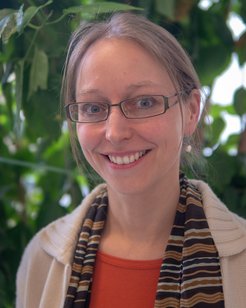Prof. Dr. Caroline Gutjahr head the new department "Root Biology and Symbiosis".
Since April 1st, 2022, Prof. Dr. Gutjahr is a new director at the Max Planck Institute of Molecular Plant Physiology. She is setting up the department "Root Biology and Symbiosis".
The interaction between soil fungi and plant roots – a symbiosis called mycorrhiza – is of great importance for the growth and health of plants. Prof. Dr. Caroline Gutjahr studies the molecular factors that influence the formation and function of this beneficial interaction.

Prof. Dr. Caroline Gutjahr is the new head of the department 1 at the Max Planck Institute of Molecular Plant Physiology (MPI-MP) in Potsdam-Golm. The department is titled "Root Biology and Symbiosis". The main topic of her research is arbuscular mycorrhiza, a symbiotic association between special soil fungi and plant roots.
The symbiosis of these fungi and plants has a long evolutionary history. Traces of fungal cells in the oldest known plant fossils suggest that arbuscular mycorrhiza may have played a significant role in the colonisation of land by plants. Still today, approximately 80% of land plants benefit from the fungi’s ability to render mineral nutrients in the soil accessible and thus contribute to improved plant growth. Crop plants also benefit from the symbiotic fungi, and exchange sugars and lipids derived from photosynthesis for essential nutrients. In addition, mycorrhiza can help to increase the resistance of crops to pests.
Prof. Dr. Caroline Gutjahr is studying the molecular mechanisms, which determine the establishment and functioning of this beneficial cooperation between plants and fungi. Central research questions revolve around whether and how the formation of the symbiosis is influenced by environmental factors and which molecules play a decisive role in this process. In addition, she investigates whether the molecular knowledge can be used to breed mycorrhiza-optimised crops, which could potentially contribute to sustainability in agriculture. Prof. Dr. Gutjahr is doing pioneering work, as she will not only focus on the molecular processes in the plant, but will also analyse the currently understudied fungi in greater detail.
“I am very much looking forward to join the MPI-MP and to build the new department of Root Biology and Symbiosis”, says Prof. Dr. Gutjahr. “The scientific excellence and the collaborative spirit at the institute struck me already at my first visit. I am convinced that this will enhance our opportunities to explore new frontiers in our understanding of arbuscular mycorrhiza symbiosis and to make great discoveries. Also, the proximity to the University of Potsdam and other research institutes at the Postdam Science Park bears great potential for fruitful scientific interactions.”
Prior to her appointment at the MPI-MP, Prof. Dr. Gutjahr conducted research in Italy and Switzerland, as a group leader at the Ludwig Maximilians University of Munich, and as a Professor for Plant Genetics at the Technical University of Munich. Due to her commitment there, Prof. Dr. Gutjahr will continue her work at the Max Planck Institute of Molecular Plant Physiology in a part-time capacity until 1.2.2023.
Prof. Dr. Dr. h.c. Lothar Willmitzer, founding director of the institute and former head of Department1 "Molecular Physiology", retired on March 31, 2022. Prof. Willmitzer conducted research on primary metabolic processes, advanced their mathematical description and was a pioneer of so-called metabolomics in plants. He will remain associated with the institute as Professor Emeritus.
Scientists at the Max Planck Institute of Molecular Plant Physiology in Potsdam-Golm investigate the fundamental processes of plant physiology and development and the interaction of plants with their environment. In addition to Prof. Dr. Caroline Gutjahr, the institute is headed by Prof. Dr. Claudia Köhler (plant reproductive biology and epigenetics) and Prof. Dr. Ralph Bock (organelle biology, biotechnology and molecular eco-physiology).
